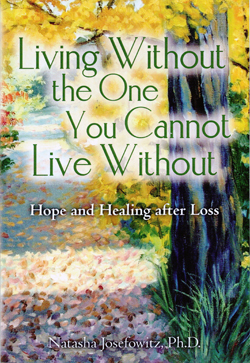Natasha Josefowitz, Living Without the One You Cannot Live Without: Hope and Healing after Loss, Prestwik Poetry Publishing Co, ISBN 9781484141328, 2013, 93 pages.
By Donald H. Harrison


SAN DIEGO– I have known Natasha Josefowitz and her late husband Herman Gadon for many years. Natasha is kind enough to regularly contribute a column to San Diego Jewish World, which we are always pleased to run because she brings a fresh–even unique–perspective to nearly every topic she considers.
Certainly that is the case in Living Without the One You Cannot Live Without, in which Natasha chronicles in poetry the private thoughts of a widow in the stillness of her apartment, when there are no friends nearby for whom she must pretend to be brave.
A San Diego rabbi, Laurie Coskey, writes on the back book cover: “I wish that I had given this book to every widow and widower that I have ever served as a rabbi for almost 30 years. Natasha has captured the journey and essence of mourning and grief from its raw immediate desperate clutches to the rays of light that pierce the darkness and finally to a new way of living.”
There are nearly 100 poems in this volume, covering the period from the time the doctors told Herman he had terminal cancer to the time when the widow Natasha begins to emerge from her grief. Most of the poems are universal, or at least, certainly American, as Natasha provides insight into the process of grieving A few of the poems are specifically Jewish. I am going to quote some lines from each category.
In the universal category is, “The Musical,” part of which reads:
the pain is not physical
it’s a terrible longing
he would have loved the play
and he’s dead
so I hurt
because the play is good
if it were bad
I wouldn’t be so upset
Specific Jewish content may be found within “The Funeral,” a poem of which I quote only a part:
what I really wanted to do
was open the casket
and lie down beside him
close the lid
and just end there
end all the pain
the pain now
and the pain
that will be forever
in the unwelcome future
instead I was given a shovel
and threw earth on the coffin
it made a hollow sound
*
Another poem of specific Jewish content, “Yahrzeit,” begins:
Today is one year
since he died
an anniversary.
I lit a candle last night
said Kaddish
a prayer for the dead
that does not mention death
and today I think about my life
my life that has become
meaningless
without him
Reading these poems, sharing Natasha’s pain, I felt guilty that I could finish the entire book in one-sitting. Her grieving period was so long, my experience of her suffering so short, and yet, here I am, writing a review.
I cannot leave you with the sense that this book is one of unmitigated grief, because it also serves up some hope.
In “Surviving in a New Year,” Natasha remembers her parents and parents-in-law, the immigrant generation, and realizes the contrast between her life and theirs. Here, again, is a snippet:
.… my husband’s mother
came by boat
at age fourteen, alone
in charge of her twelve-year-old
sister
they survived
all stories of immigrant families
stories of poverty
and untold hardship
so I have decided
to stop complaining
stop feeling sorry for myself
as I live
in a lovely retirement community
surrounded by caring friends
with no worries
about my next meal …
*
Harrison is editor of San Diego Jewish World. He may be contacted at donald.harrison@sdjewishworld.com